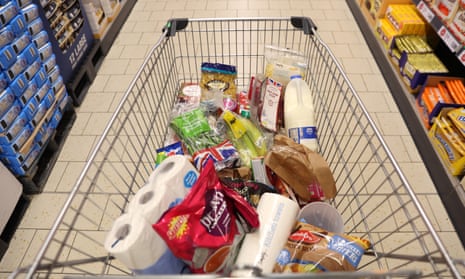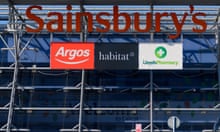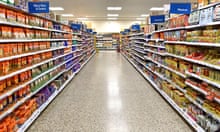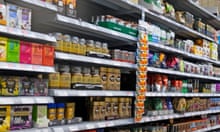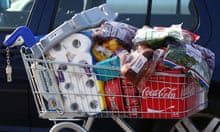Grocery price inflation in Great Britain has slowed to 3.2%, the lowest since November 2021, as the cost of toilet rolls, butter and milk fell and people spent more on store promotions.
The decline in the four weeks to 14 April marked the 14th monthly drop in a row, and compares with an annual rate of 4.5% this time last month, according to the retail analysts Kantar. The slowdown in grocery inflation was aided by a big increase in promotional spending, with items bought on offer making up 29% of supermarket sales – the highest level outside Christmas since June 2021. Overall take-home grocery sales rose by about 3%.
Deals helped shoppers save £1.3bn over the four weeks, amounting to £46 a household.
after newsletter promotion
Fraser McKevitt, the head of retail and consumer insight at Worldpanel by Kantar, said: “We’ve been monitoring steady annual growth in promotions over the past 11 months as retailers respond to consumers’ desire for value. This emphasis on offers, coupled with falling prices in some categories like toilet tissues, butter and milk, has helped to bring the rate of grocery inflation down for shoppers at the till.”
An early Easter did not dent seasonal sales, as spending on confectionery topped £100m for the first time in the seven days up to and including Easter Sunday. McKevitt said: “Higher prices have played a role in reaching that record spend figure, but the number of chocolate eggs sold in the seven days to Easter was also 3% higher this spring than last, with 37% of consumers buying one in that week. Hot-cross buns were even more popular, enjoyed by 45% of Britons.”
The growth in confectionery reflected a broader trend towards snacking in Britain. Over the past decade, there has been an increase in almost all types of snacks. Consumers ate chocolate 93m more times in the year to June 2023 than in the 12 months to June 2013. Fruit has also bumped up the list of snack choices – 314m more such items were eaten between meals in 2023 than in 2013.
Ocado was again the fastest-growing grocer this month, improving sales by 12.5% in the 12 weeks to 14 April, ahead of the total online market, which grew by 6.8%. The retailer accounted for 1.9% of take-home grocery sales, up from 1.7% a year ago. Total online sales reached a share of 12% of the whole market for the first time since July 2022.
Britain’s two largest grocers, Tesco and Sainsbury’s, gained market share to 27.4% and 15.3% respectively. Sainsbury’s’ sales increased by 6.8% and Tesco grew by 5.9%.
Lidl achieved a record 8% share of the market, also up by 0.4 percentage points compared with a year ago, fuelled by sales growth of 9.1%. Its fellow discounter Aldi reclaimed the 10% market share it last held in September 2023, increasing sales by 2.8%.
Morrisons’ slice of the market was flat at 8.7%, with spending through its tills up by 3.8%. Waitrose and Iceland also retained their market share positions at 4.5% and 2.2% respectively. Both retailers recorded sales growth of 3.7%. Asda holds 13.4% of the market, while Co-op accounts for 5.4%.
